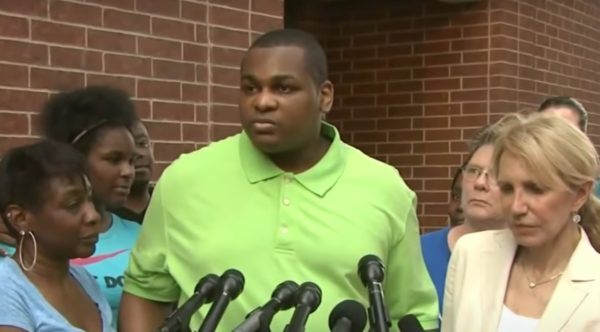The Texas Supreme Court ruled on Friday, Dec. 18, that a Black man who spent 12 years in prison for a crime he did not commit should receive compensation for his time spent behind bars, and that a state agency overstepped its legal authority in denying him compensation.
Alfred Dewayne Brown, 38, was sentenced to death for the 2003 murder of a Houston police officer but was released from death row in 2015 when the Texas Court of Criminal Appeals tossed out Brown’s conviction.
In 2013 it was discovered that during Brown’s trial the prosecution did not share with the defense some landline phone records that supported Brown’s claim that he was at his girlfriend’s house when the shooting took place.
On April 3, 2003, Officer Charles Clark was killed while responding to a robbery at a check-cashing store in Houston, Texas. Store employee Alfredia Jones, 27, was also shot and killed during the robbery, which was described at the time as carried out by three Black men. Brown and two co-defendants Elijah Joubert and Dashon Glaspie were convicted in separate trials in 2004 and 2005, with Glaspie taking a plea deal in exchange for his testimony against the other two men.
Brown was declared innocent by a judge in May 2019 when prosecutors further reviewed the case.
Upon being declared innocent, a Texas law would seemingly have allowed Brown to collect $80,000 for each year he was wrongfully imprisoned in a lump sum, plus an equal amount paid out over the course of his life. In total, Brown would be able to receive $2 million.

However, the Texas comptroller denied Brown’s application. The office said it rejected the request because it was unsure that the judge who had declared Brown innocent had the jurisdiction to do so because of a previous order in the case.
A week before the application was denied, Texas Attorney General Ken Paxton sent a letter to the office, urging the comptroller not to approve compensation for Brown because he had questions about Brown’s innocence.
But on Friday, the Texas Supreme Court ruled that it was wrong to deny Brown payment, and a spokesperson for the comptroller’s office said it would “begin the process of compensating Mr. Brown.”
The court said in the 18-page ruling that the comptroller’s office did not have the authority to weigh in on the judge’s legal authority to declare Brown innocent.
The court said the office is responsible for “purely ministerial” duty of determining someone’s eligibility for wrongful imprisonment compensation by reviewing documentation, but does not have the power to assess whether the documents were issued in a factual or legal manner.
“You have the comptroller acting like an appellate judge,” Texas Supreme Court Justice Eva Guzman said at a hearing in October. Guzman wrote that ruling.
The wife of the slain officer and the Houston Police Officer’s Union still believe Brown is responsible for Clark’s death.
After Brown was released, he moved to Louisiana and is now a truck driver. Neal Manne, one of Brown’s attorneys, said he hopes the ruling will bring a close to his client’s tragic story.
“What was important to him was having validation that he really was innocent and that what happened to him was really unjust,” Manne said. “He’s been out of prison for five and a half years, and now finally he’s got confirmation from the highest court in the state that he’s entitled to this last small measure of justice.”


